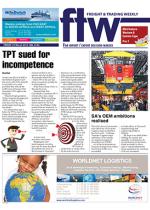After an eight-year hiatus,
SA table grapes could once
again be gracing the retail
shelves and fruit bowls in
Thailand at the beginning
of the next SA grape
season in October.
This lengthy gap in
exports – to what was a
relatively robust market
at the time – was due to a
ban imposed by Thailand
authorities. And this, in
turn, was imposed because
of a technical error in
documentation detailing
how SA fruit exporters
fulfilled the necessary
phytosanitary conditions.
The document was
submitted to the Thailand
authorities after that
country joined the World
Trade Organisation (WTO)
in 2008.
Then last year, just as
the matter was getting
close to resolution, a
political upheaval in
Thailand slammed the
brakes on the discussions.
But since things have
quietened down in that
country, valuable progress
has been made, according
to Willem Bestbier, CEO
of the SA Table Grape
Industry (Satgi).
Supported by diplomatic
and department of
agriculture forestry and
fisheries (DAFF) officials,
Satgi management visited
the plant protection
authorities in Thailand last
November.
“The major objective,”
said Bestbier, “was to
get them to approve
our phytosanitary and
technical market controls
this side. And we felt we
had managed to gain their
approval.”
“The Thai authorities
subsequently visited SA for
two weeks in January to
inspect our systems firsthand.
“The results of this
inspection and a meeting
with DAFF were both
constructive and positive,”
he said.
The Thai authorities
have now returned home to
prepare their report, which
Bestbier is convinced will
be favourable.
“We have strong hopes
that from the October start
of our 2015-16 season we
will be again exporting to
Thailand,” he said.
“We were significant
players eight years ago,” he
told FTW, “and we would
have been even stronger if
we had had continuity over
those missing years.
“We now face the
challenge of once again
fighting off the other
competitors,
but we feel
we have some
advantages.”
Bestbier
noted, for
example,
that SA’s
“early grapes”
were indeed
early when
compared
to the
opposition
crops.
“We also
have good
quality fruit and offer a
more attractive varietal
market,” he added.
One logistical restraint
is the Thai demand for
cold sterilisation – holding
the grapes for 22 days at
minus six degrees to make
sure the product is free of
bugs.
“But we have the
technology and
expertise to handle this
requirement,” Bestbier
said.
He also indicated that,
once the draft protocol for
exporting table grapes
into
Thailand
was finally
completed,
a similar
technical
process
would
follow for
other SA
deciduous
fruits –
pome fruit
(apples and
pears) and
stone fruit
(apricots,
nectarines and plums
in the case of SA) to be
cleared for export to that
country.
INSERT
We have strong
hopes that from the
October start of
our 2015-16 season
we will be again
exporting to Thailand
– Willem Bestbier

